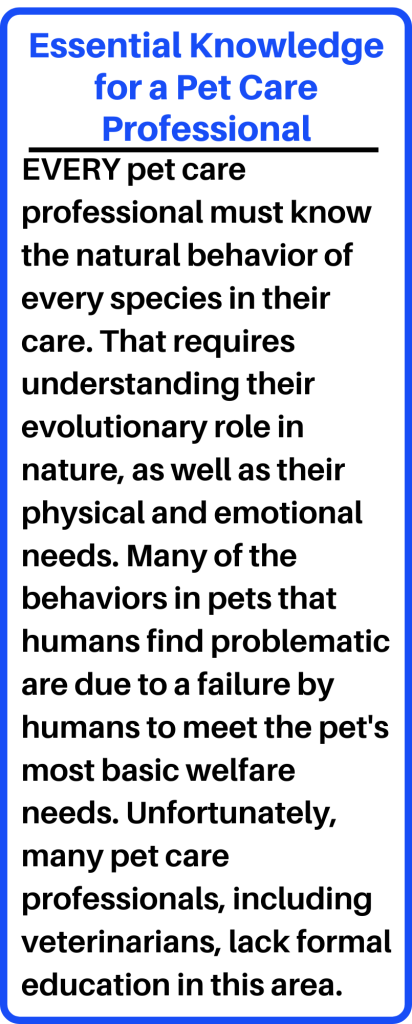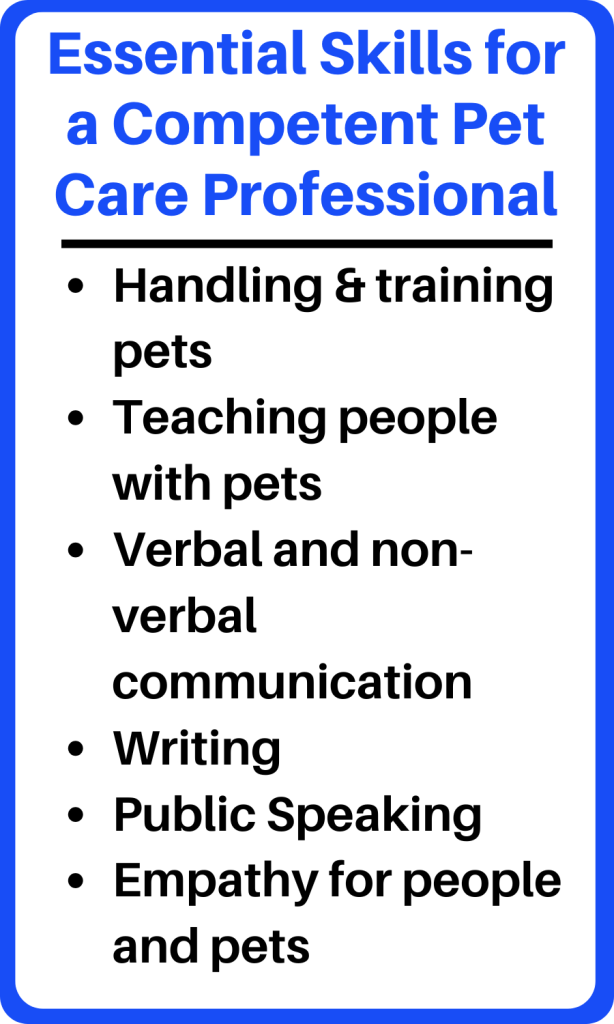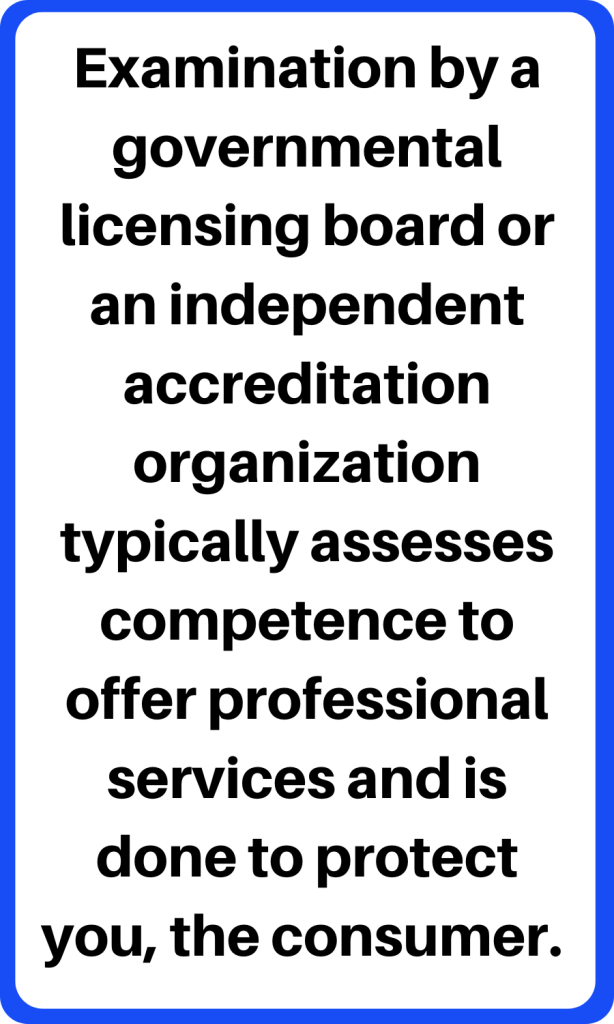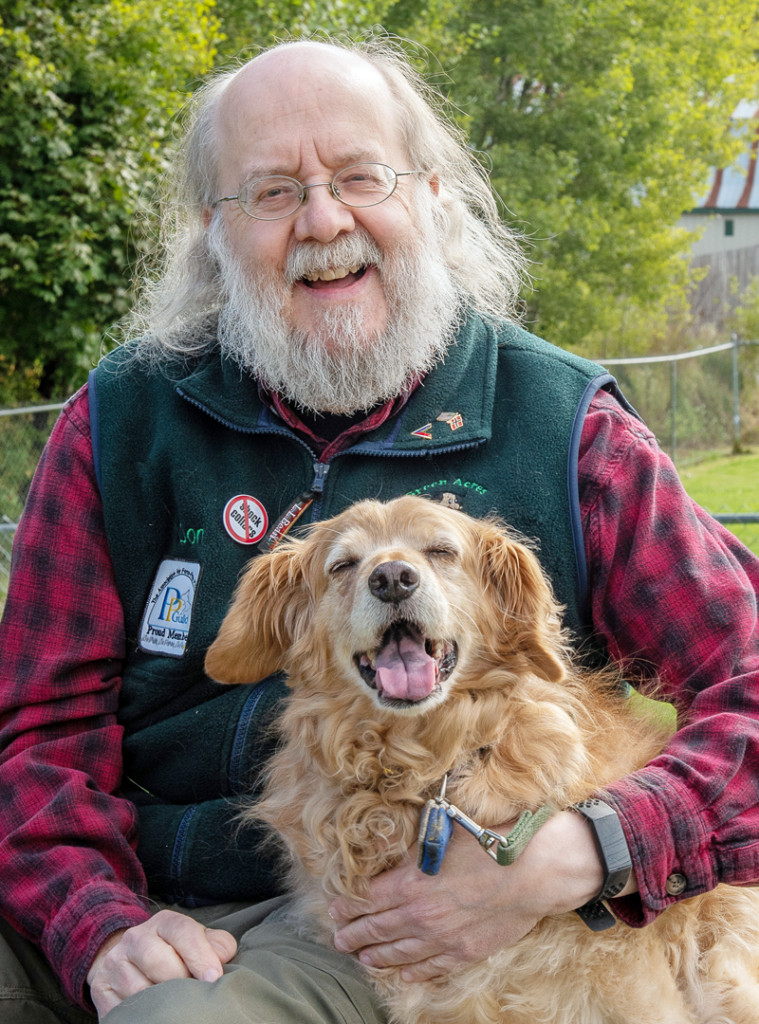Pets and Their People Blog
What to Look for in a Pet Care Professional–Part 2: Knowledge, Skills, Competence, and Credentials
In What To Look For In A Pet Care Professional–Part 1, I discussed the importance of carefully reviewing the ethics policies of any pet care professional before entrusting your pet to their care. Here, I’ll discuss the importance of pet care professionals acquiring knowledge and skills and demonstrating competency through independent accreditation bodies. Lastly, I’ll address the importance of continuing education.

Acquisition of Knowledge
People might become pet care professionals because they have a passion for animals. However, living with them as pets, or breeding them, is unlikely to provide people with the knowledge they need to be a pet care professional. While there are degree programs for veterinarians and licensed veterinary technicians, very few post-secondary programs that lead to a recognized degree exist for other pet care professionals, although this situation is starting to change.
Every pet care professional must know the natural behavior of every species in their care. That requires understanding their evolutionary role in nature, as well as their physical and emotional needs. Many of the behaviors in pets that humans find problematic are due to a failure by humans to meet the pet’s most basic welfare needs. Unfortunately, many pet care professionals, including veterinarians, lack formal education in this area.
While dogs and cats have been living alongside humans for several thousand years, that is a relatively brief interval from an evolutionary perspective. Both dogs and cats can be predators or prey, and those instincts are still deep in their DNA, as is what makes them feel safe and what makes them fearful. It is essential for a pet care professional to know this trait so as not to cause a pet undue distress. To intentionally cause an animal to be afraid or feel intimidated is not only counterproductive but also inhumane and abusive. No sane pet owner or parent wants that for their pet. A pet care professional’s priority is always to ensure a pet feels safe.
When selecting a pet care professional, ensure they are familiar with the The Five Freedoms.
One can learn what they need to know as a pet care professional in many ways. When I began my journey in 1995, my mentors advised me to read numerous books and attend various seminars. They also emphasized that I continue to read and attend conferences and webinars as true professionals NEVER stop learning. That was incredibly important advice, and unfortunately, not followed by some in my profession who seem to believe that doing things the same way they were done 30 or 40 years ago is acceptable.
The widespread circulation and acceptance of mythical and erroneous information complicate a thorough understanding of pet behavior. This misinformation campaign makes it difficult for consumers to assess a professional’s knowledge (which will be addressed in the section “Assessing Competence” below).
Acquisition of Skills

There’s “book smart” and “street smart,” and the two do not always come from the same individual. To work with pets, you must have a sound knowledge base and the ability to apply that knowledge skillfully. The required knowledge and skills will often vary from species to species.
Skill does not happen overnight; it grows with experience and practice. That is why professionals, such as doctors, lawyers, veterinarians, accountants, architects, canine behavior consultants, and dog trainers, work in a “practice” as they continually learn new things and improve their skills.
Pet care professionals must be highly skilled at handling and training pets, as well as adept at teaching the people who live with them. You, our clients, encompass a diverse range of ages, educational levels, and learning styles. To effectively assist you, professionals must possess excellent verbal and nonverbal communication skills, be comfortable talking in front of a group, demonstrating skills, and writing detailed explanations of how to teach a pet.
Since a pet care professional develops their skills through numerous interactions with diverse people and pets, they often begin as apprentices to someone who already possesses both the knowledge and skills.
Assessing Competence Through Independent Accreditation

When one completes their education and acquires the knowledge and skills necessary to practice their profession, they must typically demonstrate their competence. Just because someone has a degree or diploma does not necessarily mean they are competent. Examination by a governmental licensing board or an independent accreditation organization typically assesses an individual’s competence to offer professional services and is conducted to protect the consumer.
Veterinarians in the United States are required to pass a national examination, and depending on the state, they may also be required to pass a state-specific licensing exam. For the most part, other pet care professionals are not required to have a license.
However, to improve consumer protection and the profession, two independent organizations offer psychometrically sound examinations and accreditations through an independent, third-party examination. These organizations are the Pet Professional Accreditation Board (PPAB) and the Certification Council for Professional Dog Trainers (CCPDT). These accreditations are for professional dog trainers and canine behavior consultants. To eliminate bias, both organizations have their exams administered and graded by independent examination bodies.

Unfortunately, the CCPDT still allows its certificants to use aversive tools, such as shock, choke, and prong collars, despite the ethical and technical standards of the dog training and behavior profession deeming these tools and methods inappropriate, unnecessary, and contrary to basic animal welfare [see Part 1 of this series]. While other organizations may issue certificates, an independent body does not administer their exam process, so an organization’s bias is not eliminated.
Lifelong Learning and Continuing Education
Because knowledge and skills continually evolve, state licensing boards and organizations, such as the PPAB and CCPDT noted above, require professionals to complete continuing education units (CEUs) regularly to maintain their licenses or accreditation. This requirement is no different than what is required for most professions.

I advise against hiring any pet care professional who is not licensed or independently accredited.
About the Author

Don Hanson lives in Bangor, Maine, where he is the co-owner of the Green Acres Kennel Shop and the founder of ForceFreePets.com, an online educational resource for people with dogs and cats. He is a Professional Canine Behavior Consultant (PCBC-A) accredited by the Pet Professional Accreditation Board (PPAB) and a Bach Foundation Registered Animal Practitioner (BFRAP). A Pet Professional Guild (PPG) member, Don serves on the Board of Directors and Steering Committee and chairs the Advocacy Task Force and Shock-Free Coalition. He is also a founding director of Pet Industry Advocacy International (PIAI).
The opinions in this article are those of Don Hanson.
©2025, Donald J. Hanson, All Rights Reserved

